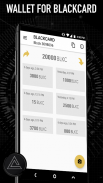





BLACKCARD Wallet - Cryptocurrency ICO 2019

Description of BLACKCARD Wallet - Cryptocurrency ICO 2019
Send, Receive and Store BLACKCARD Cryptocurrency.
BLACKCARD crowdsale is scheduled for January 2019 on BLKC.info
What is BLKC?
We are building a platform for the future of credit cards.
While existing solutions offer to solve a problem, they are expensive to use and maintain that results in high transaction fees. Our team is building a truly decentralized, secure, useful, & easy-to-use product based on Ethereum blockchain. It will include an easy token payments integration and even a digital arbitration system.
In the end, our mission is to integrate all digital service sellers into a unified blockchain ecosystem, which will make the business truly efficient, transparent, and reliable.
BLACKCARD is built on blockchain technology. A blockchain functions as a secure, public ledger of all transactions on a peer-to-peer network that cannot be tampered with except through the use of an impractically large amount of computing power. A complete copy of the ledger is stored on each node in the network, allowing for such security. Specifically, BLACKCARD is built on the Ethereum blockchain in order to achieve a completely decentralized system. The benefits of a decentralized system are numerous. Firstly, on a decentralized system, there is less likely to be a single point of failure on the network. In a centralized system, if the central node in the network fails, the whole network fails with it. However, in a decentralized system, the network’s data and computational power is distributed among many nodes, requiring a larger number of nodes to fail before the network is seriously impacted by the failures. Secondly, by distributing computing resources across a decentralized system, as the network grows, so too does the computational power of the network. Finally, in conjunction with blockchain technology, a decentralized network allows transactions to be independently verified by any node in the network, eliminating the need for trust in a central institution to verify transactions for everyone. As the benefits of a decentralized network become more apparent, it is clear that the future of the web (sometimes called Web 3.0) is a decentralized one.
a4dc321910

























